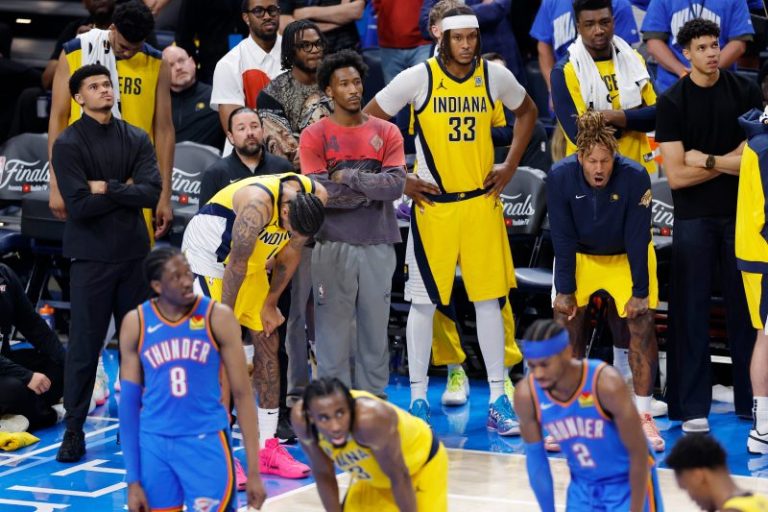For the second consecutive season, the Indiana Pacers exceeded external expectations and pressed deep into the NBA playoffs.
But, also for the second consecutive season, they fell short of their objective of winning the Larry O’Brien Trophy. And in each case, the Pacers were eliminated by the eventual NBA champions.
The most difficult part for the Pacers is that, with star point guard Tyrese Haliburton going down early in Game 7 with an Achilles injury, Indiana never got its chance to fully put its best foot forward. Now, it must ponder the what-ifs over the course of an entire offseason.
The Oklahoma City Thunder dispatched Indiana on Sunday, June 22, 103-91, in Game 7 of the NBA Finals, one year after the Pacers made a surprising run to the Eastern Conference finals. Behind the clutch play of Haliburton, the steady offensive production of forward Pascal Siakam and overall team buy-in that saw drastic improvements on defense, the Pacers proved that they can be a formidable force, confounding and frustrating some of the NBA’s best teams. But can this roster, as currently constructed, with Haliburton now potentially sidelined deep into next season, win an NBA Finals?
“No moral victories, obviously,” Pacers backup point guard T.J. McConnell said after the game. “Deflated. But proud of everything we’ve accomplished. There’s no award for second place, obviously, so everyone’s upset.”
Both last year, against the Boston Celtics, and this season against the Thunder, the Pacers met opponents who had just a little bit more. More consistent star power (Jayson Tatum and Jaylen Brown; Shai Gilgeous-Alexander and Jalen Williams), more effective defenses, more versatility needed to win.
Indiana wouldn’t be the only good team to ultimately miss out on its championship window.
The Utah Jazz made the playoffs 20 consecutive seasons from 1984-2003. In a seven-year stretch from 1992 through 1998, they reached the Western Conference finals five times and made consecutive trips to the NBA Finals in 1997 and 1998. But they didn’t win the title.
The Phoenix Suns earned 13 consecutive postseason berths from 1989 through 2001. They made the Finals in 1993, but lost.
The Seattle SuperSonics (who later became the Thunder) under George Karl also come to mind. They lost in the championship round in 1996.
Each of those squads ran into Michael Jordan in the Finals.
And though No. 23 has been retired since 2003, the young Thunder are set up to contend for multiple titles.
“I told these guys coming into this that there’s no feel-good scenario when you get to the Finals and are unable to get it done,” Pacers coach Rick Carlisle said.
The Pacers do have a formula that works. They sprint out in transition and are so well conditioned that they can full-court press on defense. With their tempo, they can exhaust opponents and be a nightmare to defend.
But Haliburton is the team’s engine. He is the one who dictates the tempo at which the Pacers play. Without him, Indiana struggles to create open looks; just look at the third and fourth quarters in Game 7 as proof, when the ball stagnated and McConnell was the only source of offense.
If Haliburton does indeed miss most of next season, Carlisle will need to get creative to keep the Pacers afloat until he’s able to return — if he’s able to return at all. Unquestionably, McConnell and backup guard Bennedict Mathurin will need to step up.
But, realistically, even when he is healthy, the team often needed more consistent scoring from Haliburton, who is one of the game’s premier distributors, but a player who often defers too much to his teammates.
Siakam is a star player, guard Andrew Nembhard and forward Aaron Nesmith are steady, rotation role players. Mathurin can often ignite off the bench, though he is susceptible to error-prone play on occasion.
Center Myles Turner, a key presence on both ends, is set to become an unrestricted free agent. Indiana, whether it’s Turner or not, needs to find a solution at the 5.
Regardless, the Pacers might still be a piece or two away. Perhaps they can bypass that if Mathurin, who turned 23 on June 19, continues to develop and embraces efficiency. Regardless, these two deep playoff runs have proven that the Pacers are lacking — though, to be clear, it’s not by much.
As the players from so many good but not great teams before them can attest, championship windows typically close just as quickly as they spring up.
‘We tried our best,” Siakam said after the game. ‘But at the end of the day, you win some, you lose some, and we’ve just got to be strong and keep going. I told everyone, I love every single one of these guys, and I wouldn’t do it with anybody else. I’m super proud. So proud of the team.
‘But, you know, it’s hard to look forward into the future after you lose like this.’

